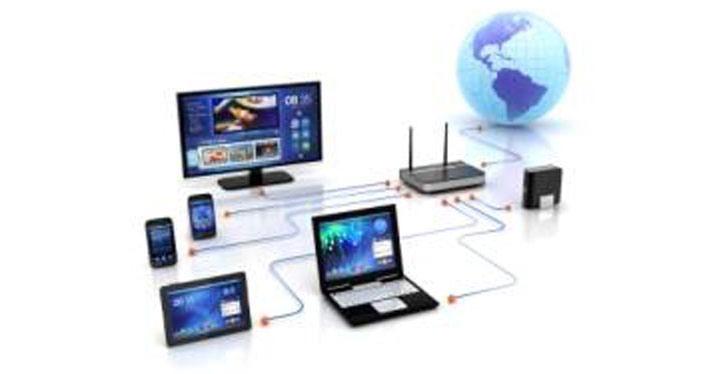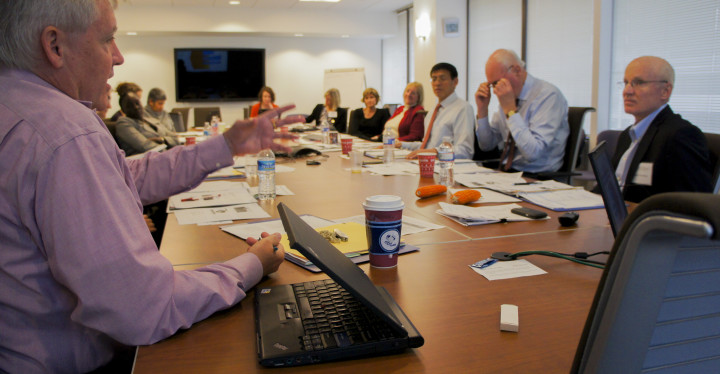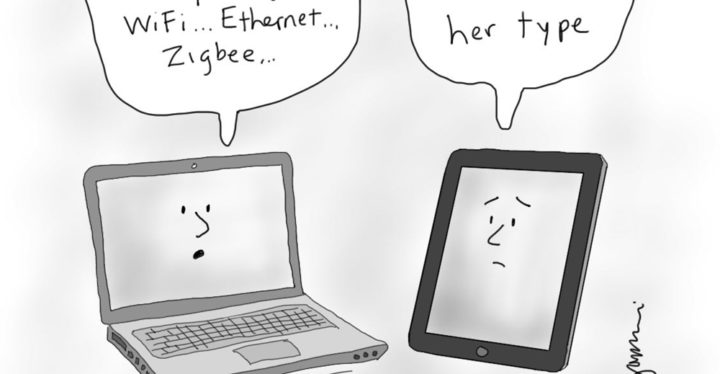This article originally appeared in Sustainable Cities Collective
Undergirding all of the promising services that figure to play prominently in tomorrow’s sustainable “smart” cities—new economic and governance models, improvements in personal health and public safety, advanced capabilities for traffic, waste, and water management, etc.—will be foundational information and communications technologies (ICT) and networking capabilities that are rapidly emerging around the world today. And undergirding augmented reality, cloud computing, e-health, the Internet of Things (IoT), smart grid, and other innovative capabilities are foundational technology standards.
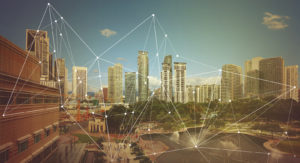 Standards play a crucial role in the success and efficiency of solution deployment by providing industry with a lower-cost platform for ongoing innovation and expanding market growth and consumer choice. Not only do standards effectively give manufacturers a blueprint on which to build their products, they also provide greater assurance of a sufficient market for those products.
Standards play a crucial role in the success and efficiency of solution deployment by providing industry with a lower-cost platform for ongoing innovation and expanding market growth and consumer choice. Not only do standards effectively give manufacturers a blueprint on which to build their products, they also provide greater assurance of a sufficient market for those products.
For smart cities, crucial, consensus-based standards are being created and refined through globally-open collaboration across traditional geographic, industrial, and technological boundaries. How is standards innovation helping bring about the quality-of-life and sustainability advances that are envisioned for the world’s city dwellers?
The Infrastructure of Sustainability
Open standards are instrumental to ongoing innovation and global market growth in technology development that will have a long-term impact on tomorrow’s sustainable cities. In the decades to come, standards will create a foundation of interoperability upon which next-generation technologies and capabilities can be cost-effectively and seamlessly layered.
It was this thinking that led to the launch of the globally-open development effort to create IEEE P2413, Draft IEEE Standard for an Architectural Framework for the Internet of Things (IoT). This standard-development project was initiated in light of insights gleaned from cross-disciplinary workshops and roundtables that the IEEE Standards Association (IEEE-SA) held with global IoT leaders.
IEEE P2413 (http://standards.ieee.org/develop/project/2413.html) is in development to propose an architectural framework supporting cross-domain interaction, system interoperability and functional compatibility, and to fuel the growth of the IoT market. The standard is being designed to offer a reference model defining relationships among various IoT verticals such as transportation and healthcare (the same verticals that are being transformed in the world’s transition to smart cities) and their common architectural elements.
The IEEE-SA is known for taking a system-of-systems perspective in standardization. IEEE 2030, IEEE Guide for Smart Grid Interoperability of Energy Technology and Information Technology Operation with the Electric Power System (EPS), End-Use Applications, and Loads, is another example of the type of overarching effort that is being undertaken in the development of IEEE P2413. The IEEE 2030 development effort integrated wide-ranging expertise from the world’s power, energy, information technology, and communications spaces. Such coordination and scope are required for the development of foundational standards for environments such as the IoT and smart cities, in which new technologies and legacy must work together to enable new capabilities and applications.
Of course, many of the standards that tomorrow’s sustainable cities will require already exist. Beyond IEEE P2413 and IEEE 2030, the IEEE-SA’s portfolio of standards and standards in development already include many of prime relevance to this space, such as IEEE 802.3, IEEE Standard for Ethernet, and IEEE 802.11 [1], which enables products that are often branded as “Wi-Fi” in the market. But additional standards development will be required in far-ranging areas including augmented reality, cloud computing, e-health, the IoT, and the smart grid.
Facilitating Collaborative Innovation
It won’t happen magically. The challenges of bringing about globally-relevant standards for tomorrow’s smart cities are substantial, including enabling seamless technology and application integration; taking into proper account varying regional, governmental, and regulatory priorities; and fueling consumer confidence.
Global, open standards development rooted in inclusivity and due process provides a balanced, multi-stakeholder environment for working together to forge solutions and advance innovation for tomorrow’s smart cities. The IEEE standards-development process is noted for such characteristics and adheres to the standardization principles stated by the World Trade Organization (WTO), including openness, consensus, balance, right of appeal, and due process. Thousands and thousands of individuals—from startups to well-established companies around the world, companies that in many cases are competitors of one another—have contributed to the open development of IEEE standards.
IEEE provides a proven, democratic platform for globally-open collaboration for the benefit of humanity—not only in the creation of standards, but throughout the whole lifecycle of technology innovation.
IEEE is the world’s largest professional association dedicated to advancing technological innovation and excellence for the benefit of humanity, with about a half million members in over 160 countries. IEEE annually hosts more than 1,400 conferences across multiple technology disciplines, and IEEE Xplore is home to over 4 million technical documents that are available to engineers worldwide. Technologists around the world tap into unmatched access to cross-disciplinary expertise through IEEE.
The IEEE Future Directions Committee is focused on new and emerging technologies and world challenges specifically, and coordinates IEEE technical resources around the world. Initiatives have been created around key, rapidly developing areas of innovation, including big data, cybersecurity, green ICT, rebooting computing, smart cities, software defined networks, and smart materials. IEEE Smart Cities (http://smartcities.ieee.org), for example, was launched to provide a global, multidisciplinary forum through which the world’s cities can share their unique lessons learned and best practices as they undertake technological and behavioral innovation across diverse areas such as energy, food and water, public health and safety, communications, etc.
The IEEE Smart Cities initiative is also working closely with the municipalities and government bodies of the selected smart cities to build awareness. As part of the education focus, two massive open online courses (MOOCs) have been developed on the Edx platform: Big Data for Smart Cities and Introduction to Metrics for Smart Cities.
Conclusion
IEEE technologists are dedicated to advancing technological innovation and excellence for the benefit of humanity, and they cover augmented reality, cloud computing, e-health, the IoT, smart grid, and other technologies that will have a role in tomorrow’s smart cities. But IEEE isn’t just helping facilitate development of standards and technology for smart cities. Through standardization and other globally-open collaborative activities, IEEE is staying engaged with stakeholders of diverse technology areas and geographic markets around the globe as cities evolve over the long-term to achieve sustainability and advances in quality-of-life for their inhabitants.
Learn more about IEEE standards and the important role they play in the advancement of technology through IEEE Standards University. View IEEE’s educational offerings regarding smart cities through the IEEE Smart Cities website.
References
[1] IEEE 802.11, IEEE Standard for Information Technology–Telecommunications and information exchange between systems, Local and metropolitan area networks–Specific requirements, Part 11: Wireless LAN Medium Access Control (MAC) and Physical Layer (PHY) Specifications.
Bill Ash is the Strategic Technology Program Director for IEEE-SA. He received his BSEE from Rutgers University School of the Engineering. His background is in the RF industry as he worked as applications engineer on wireless communications systems. Bill has been with the IEEE Standards Association (IEEE-SA) for over 12 years working with standards development groups covering technologies such as RF emissions, distributive generation and the National Electrical Safety Code®. He is currently leading the eHealth, smart grid , and smart cities, for the IEEE-SA.
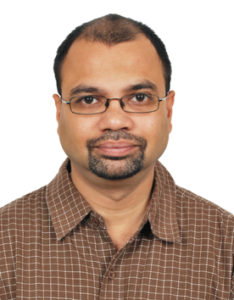
Srikanth Chandrasekaran (Sri) is the Director Standards and Technology, associated with the IEEE India office for the past 4 years with focus on key emerging technologies including IoT, Sensors, Smart Cities, Big Data, Sensors, Smart Grid, and e-Health. Sri also has a specific focus on standardization initiatives in India to engage the local technical community to the global IEEE standards development efforts. Prior to joining IEEE, Sri was associated with Freescale Semiconductor Inc. (formerly Motorola Inc.) for 18 years, managing a global team focused on development of software tools and technologies in the area of Electronic Design Automation. Sri holds a Bachelor of Science degree in Physics from Madras University, India and a Master of Engineering degree in electrical communication from Indian Institute of Science, Bangalore, India.

